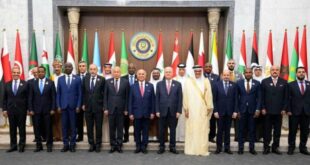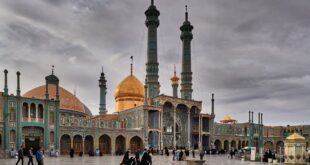Influential Shiite cleric Ammar Hakim held talks in Ramadi on Sunday with a powerful Sunni tribal sheikh, which observers said were highly symbolic for reconciliation in war-torn Iraq.The meeting between Hakim, a leading figure of the Supreme Islamic Iraqi Council (SIIC), and Sheikh Ahmed Abu Reesha, leader of a Sunni coalition in western Anbar province formed to fight Al Qaeda, was tightly guarded by Iraqi troops and police and the US military.
Sheikh Ahmed took over as head of the Anbar Awakening Council when his brother Sheikh Abdul Sattar Abu Reesha was killed by a bomb near his home in Ramadi, capital of Anbar, on September 13.
Sunday’s visit was the first by a leader of the SIIC to the Sunni stronghold in volatile Anbar province, long a bastion of resistance to the US-led invasion and opposition to the Shiite-dominated Iraqi government.
Hakim was accompanied to Ramadi by Hadi Amri, the head of the Badr Brigade, SIIC’s powerful militia which is accused of violence against the country’s Sunni Arabs.
Tribal chiefs at the meeting hailed the visit, calling it important for reconciliation in a country riven with bitter sectarian divides that have led to the killings of thousands of Iraqis.
Sheikh Ahmed asked Hakim to help quell sectarian violence and vowed to continue the work against Al Qaeda started by his brother. Hakim hailed Sheikh Abdul Sattar Abu Reesha as a “real national heroâ€.
“Iraqi soil is for everybody, the Shiites, Kurds and Sunnis,†said Hakim, son and heir-apparent of ailing SIIC leader Abdul Aziz Al Hakim.
On Saturday, Ammar Hakim called for the complete withdrawal of foreign troops from Iraq and rejected the possibility of permanent foreign military bases there.
He also broached the issue of federalism, calling the division of the country “an Iraqi interest, wish and decision.
“I call on this holy day for the people of my country to form [self-governing] regions, starting with the region south of Baghdad,†Hakim said in an Eid Al Fitr sermon from the SIIC headquarters in Baghdad.
The principle of federalism is enshrined in Iraq’s constitution. But Sunni Arabs, who form around 20 per cent of the population and are largely located in central, resource-poor parts of the country, have been less enthusiastic about such a plan, fearing it would deprive them of oil wealth
Meanwhile, a wave of violence across Iraq, including the bombing of a minibus filled with Shiite worshippers and a suicide truck bomb attack on a police station, has killed 32 people, officials said Sunday.
Dozens of people were wounded in the attacks, which came as Muslims were celebrating the Eid Al Fitr festival that ends the fasting month of Ramadan, the officials said.
Ten people, including three women and two children, were killed on Sunday when a car bomb exploded next to their minibus as they were heading towards a Shiite shrine in northern Baghdad, Iraqi military officials told AFP.
Women and children were also among 18 wounded by the blast in Aden Square, which was then sealed off to vehicles by the security forces.
Late on Saturday, a suicide truck bomber supported by several gunmen carried out a coordinated attack on a police station in Samarra, 120 kilometres north of Baghdad.
The truck exploded about 100 metres away from the intended target before a gunfight between the insurgents and the police.
“Seventeen people were killed and 27 wounded when a suicide truck bomber targeted police commandos in Samarra,†a police official told AFP.
The massive nighttime explosion destroyed several buildings in a residential area of the city and on Sunday people crowded around the debris as an earthmover cleared away the piles of rubble.
It was not immediately clear if any insurgents were among the dead, many of whom were women and children. Five people were also killed in two separate attacks on Sunday south of Baghdad.
Four civilians died in clashes between security forces and unidentified gunmen in the mixed town of Iskandiriyah, 60 kilometres from the capital. A fifth man was killed when gunmen opened fire on civilians in a village further south near the town of Hilla, police said.
2 Shiite armed groups claim responsibility for attacks against Polish targets
BAGHDAD (Reuters) – Two Shiite armed groups have claimed responsibility for deadly bomb attacks on Polish targets in Iraq, saying they were in response to the alleged torture of Iraqi detainees by troops from Poland.
In a video obtained by Reuters Television on Sunday, the hitherto-unknown Imam Hussein Brigades and Imam Moussa Kadhim Brigades said Poland, part of the US-led coalition in Iraq, had allied with the “devil†America to kill Iraqis.
Four masked men, all armed and with one holding a rocket-propelled grenade launcher, were seen standing in front of black flags bearing the names of their groups in Arabic script.
One read from a prepared statement. “The attacks are a clear message to Poland – Leave Iraq before you drown in its swamp as Britain did,†he said, referring to Britain’s recently announced decision to halve its force in southern Iraq by next spring.
“We want to tell Poland that all its interests in Iraq will be targeted by our resistance, including the diplomats, companies and troops. We only exclude journalists,†he said.
Poland’s ambassador to Iraq, General Edward Pietrzyk, was wounded in a triple bomb attack on his diplomatic convoy in Baghdad earlier this month.
A Polish secret service officer and an Iraqi were killed in the attack.
Five days later a car bomb killed two people near Poland’s Baghdad embassy. There were no casualties among staff or damage to the building.
“The attacks are a natural reaction to what the Polish troops are doing in Diwaniya, from killing to detentions and torturing of the people in Diwaniya,†the masked man said in the video, which was dated last week.
About 900 Polish troops are based in Qadisiya province, also known by local residents as Diwaniya, supporting the 8th Iraqi Army Division and training Iraqi soldiers and police.
“Polish troops have never tortured anyone in Diwaniya. All proper procedures concerning detention are followed,†the spokesman for Polish forces, Lieutenant-Colonel Wlodek Glogowski, told Reuters.
Polish Prime Minister Jaroslaw Kacynski has vowed to maintain Polish troops in southern Iraq, despite the attack on the ambassador.
 Eurasia Press & News
Eurasia Press & News



